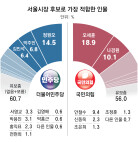Two-Year Loss from Rice Aid to North Korea: 1.2 Trillion Won
Two-Year Loss from Rice Aid to North Korea: 1.2 Trillion Won
Posted August. 18, 2004 21:57,
It turns out that a loss of some one trillion won was generated during the past two years that South Korea provided rice aid to the North.
Also, it was found that the accumulated deficit amount of the foreign exchange market stabilization fund that the government manages was close to three trillion won as of the end of last year.
According to the report on the analysis of the annual revenue and expenditures in 2003 by the National Assembly Budget Office (NABO) on August 18, the government sold 400,000 tons of rice in 2002 and 2003 respectively at a low price of 25,000 won for each 80 kilograms from the special account for grain management to the Inter-Korea Cooperation Fund, resulting in a 1.2237 trillion won loss.
This is because the cost for 800,000 tons of rice is 1.4765 trillion won, but was sold at 252.8 billion won to the Inter-Korea Cooperation Fund.
NABO is saying that the purpose of establishing the special account for grain management, for reasonable management over a government project administered in the form of a company, was stated clearly, and therefore, the rice should have been sold at a reasonable price.
Meanwhile, the foreign exchange in possession from the foreign exchange market stabilization bonds issued at the end of last year is currently 33 trillion won in Korean currency, and the cumulative valuation loss following the loss on foreign exchange and interest rate differential totaled approximately 2.97 trillion won.
This figure is the total amount of the accumulated loss until 2001 of 680 billion won, a 1.77 trillion won loss for 2002, and 520 billion for last year.
The government is explaining that most of the foreign exchange market stabilization fund consists of foreign exchange holdings, and that the deficit in the balance sheet is not an actualized loss but a valuation loss.
However, the won-dollar exchange rate fell more than it did at the end of last year, and as the size of the fund expands, the loss due to the difference in interest rates inside and outside the country will grow larger, and so the valuation loss for the fund is also expected to grow.
Ji-Wan Cha cha@donga.com







